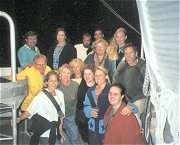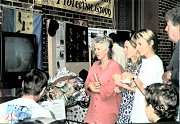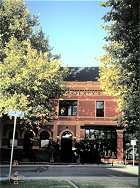Beyond 2000 - future directions in marine education
Abstracts
REGISTRATION
8.00am - 9.00am
PLENARY SESSIONS
9.00am - 10.30am
SESSION 1 WORKSHOPS
11.00am - 1.00pm |

River Sunset Cruise up the Swan River |
| |
|
A. Secondary Marine Studies Bob Moffatt
This workshop session will be valuable for all Secondary teachers or MESA members who would like to become involved with promoting marine studies in Secondary Schools.
BEST PRACTICE |
|
B. Marine Boatshed Laurie Adams
The Department of Transport has a vital role in fostering Boating Safety Education. The Marine Education Boatshed is pivotal to this role providing ‘hands-on’ ability for the department to promote Boating Safety. Programs running from the centre include Small Boat Handling, Canoeing, Snorkelling, Survival Swimming and Seatrek.
The workshop will allow participant’s to enjoy one of these programs as well as taking a look at the others. This workshop will be run from the Boatshed in East Fremantle. Participants will need to bring bathers and a towel. There is a limit of ten participants for this workshop.
BEST PRACTICE |
C. Generating Community Awareness of the Conservation Value of the Cottesloe Reef System. Cottesloe Marine Protection Group
This workshop will focus on the methodological process of generating community awareness of the biodiversity and natural heritage value of the Cottesloe reef ecosystem. Discuss the importance of engendering a sense of empowerment and community custodianship in protecting this valuable, yet vulnerable, natural asset.
POSITIVE ACTION |
|
D. Community involvement and partnerships; Sharing the responsibility of marine and coastal management. Department of Conservation and Land Management
This workshop is a double session of activities. This will include the workshop session plus the next paper presentation session. The session will cover Community Education, Community involvement in WA marine conservation reserve planning and management, Marine community monitoring program, Bush Rangers Program and Community service and participation. This workshop will involve some ‘in the field’ activities.
POSITIVE ACTION |
|
PLENARY SESSION
9.00am - 10.30am
NETWORKING SESSION
11.00am - 12 noon
TOURS
12 noon - 3.00pm |

Observing an underwater video |
- WA Museum
- Underwater World
- Dive Charter
- Penguin Island
- Marmion Marine Park
Conference Cocktail party
6.30pm - 10.00pm |
|
PLENARY SESSION
9.00am - 10.30am
11.00am - 12 noon
|
M. Using the Media as a powerful tool for Environmental Education Sheree Marris
Discover the role the media has to play in conveying environmental messages to the public. Sharing tips and advice to gauge the effectiveness of the various media components, as well as giving participants the skills on how to evaluate and use media in marine education.
BEST PRACTICE |
N. Ocean Education in the Classroom. Mark Rodrigue
There are many practical and innovative ways of bringing oceans into your classroom programs. New advances in technology mean that students can access real data about the oceans via the internet. This workshop explores some traditional and new practical strategies for including oceanography as part of a Science or SOSE program fro upper primary and secondary teachers.
BEST PRACTICE |
|
O. Recreational Rock Lobster Fisher Perceptions on Compliance Emily Stewart
Effective community education on responsible fishing involves getting the right message out to the appropriate audience. In rder to achieve recreational fisheries management through education, it is important to understand fishers perceptions and attitudes towards fishery rules and policies. This presentation will examine the main results of a recent survey investigating the attitudes and experiences of recreational rock lobster fishers in Western Australia.
Paper |
P. Territory kids: the new wave of environmental protectors Roana Bezuijen 
A major focus of the Parks and Wildlife Commission of the Northern Terriory’s Community Education unit is the Junior Ranger Program. This free, after school educational program for nine to fourteen year olds, aims to foster positive attitudes towards our natural and cultural environments, marine included, by direct experience with it.
POSITIVE ACTION |
|
Q. Fertilizers and the Hidden Sea: Increasing awareness of the impacts of groundwater discharge on the marine environment in Perth Steve Appleyard
Groundwater in Perth acts like a giant underground conveyor belt that shunts fertilizer leached from gardens into the ocean and waterways, causing significant impacts. The Water and Rivers Commission is developing education resources for schools and community groups to highlight the importance and role of groundwater as an environmental agent.
BEST PRACTICE |
R. Environmental law and Marine Conservation Sandra Boulter
Environmental laws have been made to protect the environment. These laws also affect people involved in conservation. This session will address the environmental laws affecting marine conservation. |
|
S. Learning Circles for fishers Peter Powell
The Volunteer Fisheries Liaison Officer’s from Mandurah will be running this session. Looking at all aspects of their program, including: Duty of Care, the structure required to facilitate learning through participation, the affect of policy, trial sessions, hardware needs and a look at their future directions.
POSITIVE ACTION |
T. Application and Evaluation of a Small group Activity and Open Forum Discussion in a Large Class Situation in Biological Sciences Dr Brett Molony
Although most scientists work within teams, science students are assessed via examination and reports and most students graduate with little experience in team-work or verbally presenting ideas. This paper evaluates the use of group-activities and one discussion within science class. Although results were encouraging, some students found this activity threatening.
Abstract |
3.30pm - 4.30pm |
|
U. Primary Marine Studies Bob Moffatt
This session will be valuable to all primary school teachers or MESA members who would like to become involved with promoting marine studies in primary school. Participants will be given draft copies of the Sea and Kids and Water Project. Activities of this project will be featured and the results from the school trials will be presented. An insight into Seaweek 2001 will be available.
BEST PRACTICE |
V. Tempting the Tourist Britt Anderson
Marine Education for the average tourist. Who does it, how is it done best? Using Rottnest Island, WA’s premier tourist destination, as a case study. We invite you to discuss best practice in educating a non-captive audience.
BEST PRACTICE |
|
W. Volunteers and Fishing Clinics Dennis Jennings
The Volunteer Fisheries Liaison Officer (VFLO) Program assists Fisheries WA in educating recreational fishers to Fish for the Future. One of the ways they do this is by conducting Fishing Clinics for schools and public groups. This session will also look at other Volunteer projects, including aids to assist disabled people to interact with their marine environment.
POSITIVE ACTION |
X. Fish for the Future Sue Spenceley
This workshop will take participants through the Fish for the Future Education Package developed by Fisheries WA. The Package has four sections, each concentrating on one of the four main fishing programs of fisheries in Western Australia. Recreational and commercial fishing are covered as well as an introduction to aquaculture and fish habitat protection programs in this State. The role each of these play in the conservation of fish populations and habitats is explained through interesting classroom based activities. |
Twilight River Cruise
Come aboard to an enjoyable evening on the Swan River. The Fremantle Maritime Centre will taking you on an evening cruise on the Swan. Good food, great company and a sunset on the water. |
Disclaimer: The information contained in this publication is correct at the time of printing. Fisheries WA reserve the right to alter or delete items from the program or tours as circumstances dictate and take no responsibility for any errors, omissions and changes.
Registration for this conference is limited to approximately 200 delegates and is therefore subject to availability. |
|
|
|
E. The Marine Environment and Education Opportunities Jamie Allnutt
The southern temperate waters of WA have a very special and significant biodiversity. There have been very few studies completed. This is an opportunity for the community to make a significant contribution to science and learn about the marine environment. There is a strong demand for marine knowledge from schools and dive groups.
POSITIVE ACTION |
F. EDU-CATION - Schools Taking Action for the Marine Environment Mark Rodrigue
Research has shown that the most effective way to change behaviour for environmental citizenship is for students to be involved in action projects. This workshop presents an overview of current thinking on behavioural change and provides some strategies for including marine and coastal action based programs in school programs. This workshop is based on a module from the Coasts and Marine Schools Project.
BEST PRACTICE |
|
H. Generating Community Awareness of the Conservation Value of the Cottesloe Reef System. Cottesloe Marine Protection Group
This presentation will focus on the methodological process of generating community awareness of the biodiversity and natural heritage value of the Cottesloe reef ecosystem. Discuss the importance of engendering a sense of empowerment and community custodianship in protecting this valuable, yet vulnerable, natural asset.
POSITIVE ACTION |

Accomodation for the Conference |
|
|
I. Keeping Students on Task: Strategies to Improve Excursions and Camps Terry McClaffety
Many teachers organise excursions to museums and aquariums, and some organise camps to national parks. However, the effect of visiting a venue not previously visited by the students, often resulting in some students being anxious whilst others may engage in off-task activities. Using findings from research, participants will understand students’ behaviour and develop strategies to improve teaching practice.
BEST PRACTICE
|
K. Marine Discovery Centre Tim Hoile
The Star of the Sea School has set up a Marine Discovery Centre. This centre has a focus for ‘hands-on’ opportunities for the students. The experience has lead to the Star of the Sea School assisting other schools to set up other Marine Discovery Centres.
BEST PRACTICE |
|
MESA AGM
5.00pm - 6.30pm
Wednesday 19th April, 2000
PLENARY SESSION
9.00am - 10.30am
NETWORKING SESSION
11.00am - 12 noon
TOURS
12 noon - 3.00pm
- WA Museum
- Underwater World
- Dive Charter
- Penguin Island
- Marmion Marine Park
Conference Cocktail party
6.30pm - 10.00pm

Observing an underwater video
|
|
|